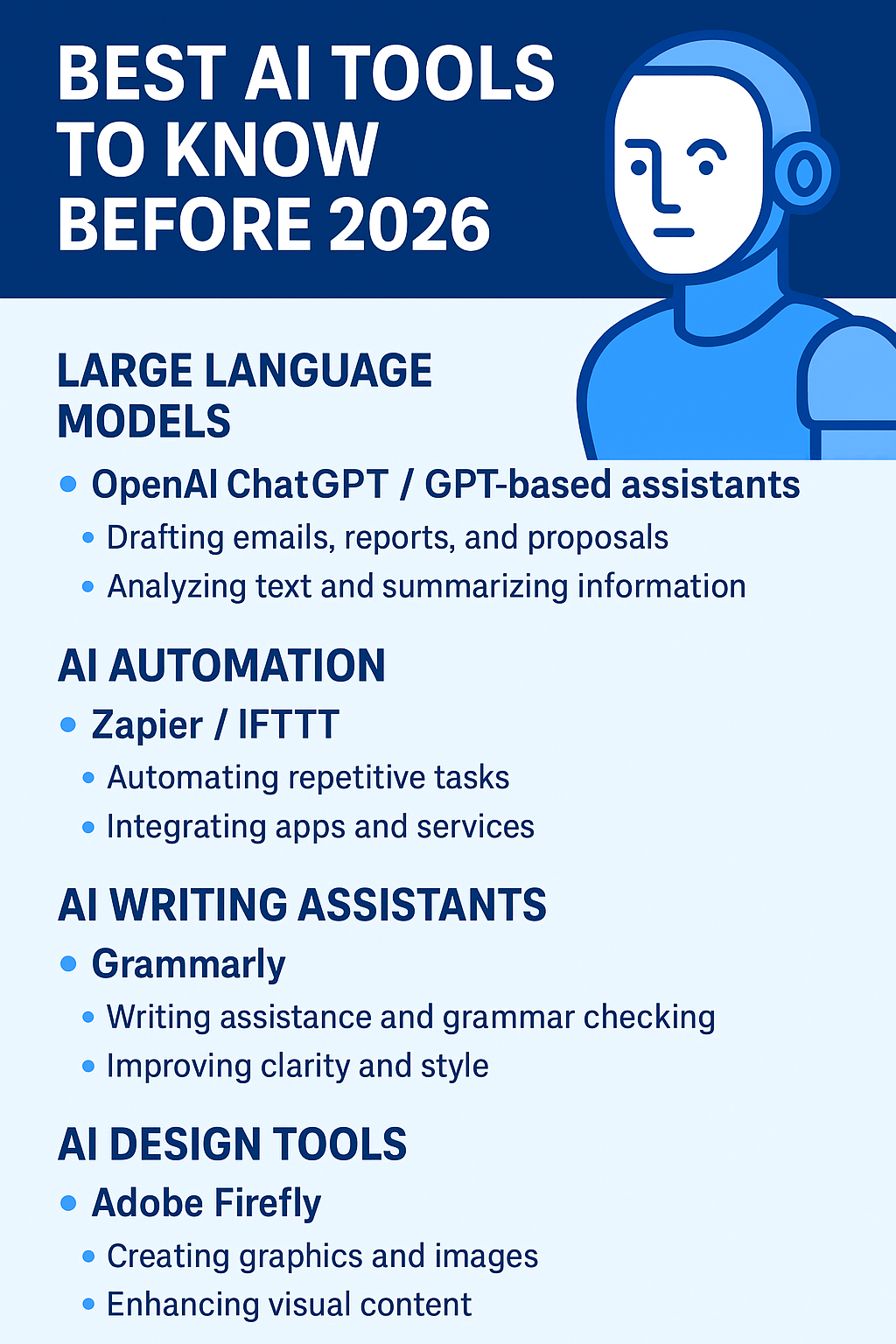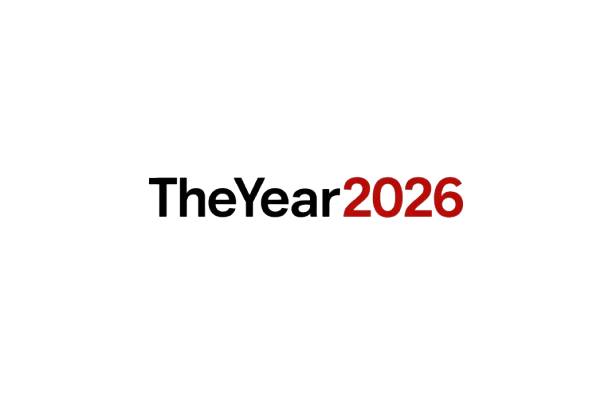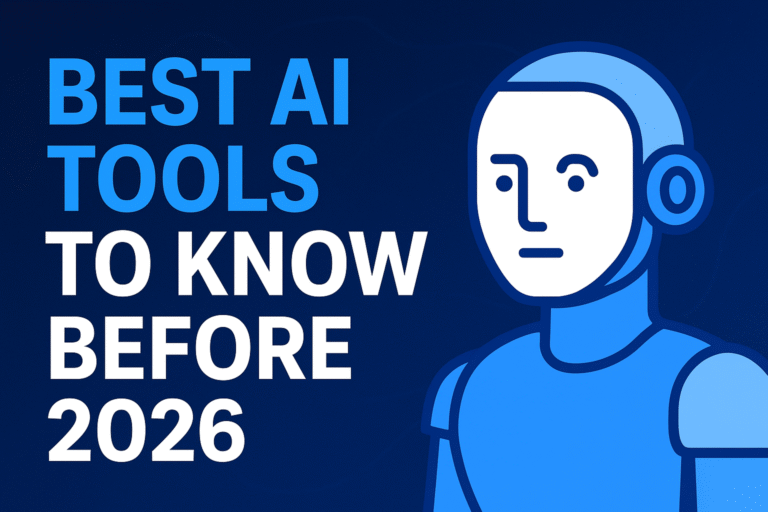Artificial intelligence isn’t slowing down; it’s speeding toward a world where AI fluency is as fundamental as literacy. By 2026, the workers, creators, and business owners who understand how to use AI tools will operate at a level that feels superhuman to everyone else.
This guide explores the best AI tools you should master before 2026, grouped by their real-world impact not hype.
It also includes a dedicated section on AI in daily life, where the everyday consumer will feel the biggest shift.
1. AI Tools for Productivity & Workflow Automation
These tools will eliminate 40–70% of manual tasks across most industries.
Notion AI
Notion AI turns your workspace into a living knowledge system. It summarizes long documents, generates drafts, builds task lists, rewrites content, and analyzes uploaded material without breaking the natural Notion workflow.
Why it matters: By 2026, knowledge workers will be expected to manage projects, notes, and knowledge bases with AI assistance rather than manual sorting and writing.
Google Gemini / ChatGPT / Claude
Large language models (LLMs) will be the most essential digital tools of the decade.
These tools handle:
- Research
- Planning
- Writing
- Coding
- Business strategy
- Data interpretation
- UX ideation
- Content generation
- Personal tutoring
- Automation instructions
Why it matters: These models become your personal assistant, analyst, editor, and strategist rolled into one. Not knowing how to prompt them effectively will become a career disadvantage in 2026.
Zapier AI + Make.com AI
Automation platforms with AI built in capable of connecting thousands of apps and triggering tasks automatically.
Examples:
- Auto-send email summaries
- Sync CRM data
- Trigger social posts
- Move customer contacts
- Create invoices
- Convert form submissions into reports
Why it matters: You’ll spend less time clicking and more time creating. Companies will increasingly expect applicants to know basic automation skills.

2. AI Tools for Content Creation & Marketing
The marketing industry will be nearly 80% AI-assisted by 2026.
Jasper AI
A full-stack AI solution for marketing teams generating ad copy, email sequences, landing pages, and social content with brand voice consistency.
Why it matters: Marketing speed will define competitiveness. Teams using Jasper will create campaigns 10× faster.
Canva AI
Canva’s AI features (Magic Write, Magic Erase, Magic Resize, and image generation) make professional-level design accessible to non-designers.
Why it matters: By 2026, content velocity not just quality will be the differentiator. AI-driven design tools will help creators meet the demand.
Descript AI
An AI-powered audio/video editing tool that edits media like a document cut, tweak, overdub, or change scenes in seconds.
Why it matters: Content studios will run leaner as AI eliminates video editing bottlenecks that used to require multiple people.
3. AI Tools for Software Development
Coders will not be replaced but augmented beyond recognition.
GitHub Copilot
Your AI pair programmer. It suggests code, writes functions, detects errors, and accelerates development times dramatically.
Why it matters: By 2026, developers using AI will produce 3–5× more output than those coding manually.
Replit AI
A browser-based coding environment that lets beginners build full apps with conversational prompting.
Why it matters: Non-technical founders will build MVPs faster than ever reducing barriers to launching new products.
Cursor AI
A new breed of AI-first coding workspace that can understand entire codebases, suggest architecture improvements, and create features end-to-end.
Why it matters: Understanding tools like Cursor by 2026 will become the new competitive edge in software engineering.
4. AI Tools for Business, Sales & Analytics
Tableau Pulse with AI
Data insights become conversational and dynamic.
Why it matters: Teams no longer need analysts to translate dashboards AI explains trends instantly.
Salesforce Einstein
AI embedded directly into customer relationship management (CRM): lead scoring, predictive analytics, and automated sales flows.
Why it matters: Sales teams will outperform massively using predictive AI instead of intuition alone.
ElevenLabs AI
Voice cloning and text-to-speech designed for marketing, training, and customer engagement.
Why it matters: Brands will create multilingual audio content at scale without hiring voice actors for every locale.
5. AI Tools That Impact Everyday Consumers (AI in Daily Life)
The biggest transformation before 2026 will not happen in offices it will happen at home.
Google Assistant + Gemini Integration
Your daily assistant becomes smarter and more context-aware:
- Summarizes emails
- Plans itineraries
- Manages household reminders
- Suggests healthier routines
- Works across devices
This is the beginning of ambient AI.
Amazon Alexa with AI Upgrades
Now capable of:
- Predictive household management
- Automated ordering of essentials
- Personalized energy-saving suggestions
- Smart device orchestration
AI Fitness Apps (Whoop, Fitbit AI, Apple Health AI)
Health monitoring becomes predictive, not reactive.
Features include:
- Stress-level detection
- Sleep optimization
- Early signs of health issues
- Personalized workout coaching
By 2026, wearable AI will quietly become the first layer of preventative healthcare.
AI Personal Finance Tools (Copilot Money, Monarch AI, Cleo AI)
These apps use your spending data to:
- Build budgets
- Flag unnecessary costs
- Suggest saving opportunities
- Detect fraud
- Optimize subscriptions
This is financial clarity without spreadsheets.
AI in Smart Homes
Devices like Nest, Hue, and Ring will integrate deeper with AI systems:
- Automatic energy adjustments
- Security alerts with context
- Personalized home routines
- Predictive maintenance notifications
AI will quietly run much of the house.
6. AI Tools for Creativity & Design
Midjourney
Image creation with artistic precision ideal for branding, thumbnails, concept art, and product design.
Adobe Firefly
Integrated directly into Photoshop, Illustrator, and Premiere.
Features:
- AI-powered image edits
- Video scene extension
- Creative suggestions
- Smart object generation
Why it matters: By 2026, designers will co-create with AI rather than starting from scratch.
7. Skills You Must Learn to Use These AI Tools Effectively
Tools are only powerful in the hands of someone who knows how to use them.
Before 2026, focus on:
- Prompt engineering
- AI-assisted research
- Automation workflows
- AI ethics and verification
- Multi-tool integration
- Critical thinking over blind trust
Your value won’t come from knowing the tools, it’ll come from knowing how to make the tools work together.
Final Thoughts
AI will not replace people it will replace people who don’t learn how to use AI.
Mastering these tools before 2026 will:
- Increase income
- Accelerate career growth
- Boost creativity
- Reduce burnout
- Open new business opportunities
- Future-proof your skillset
The gap between AI users and non-users will eventually look like the gap between computer users and those who refused to learn computers in the 90s.
The best time to prepare? Today.

